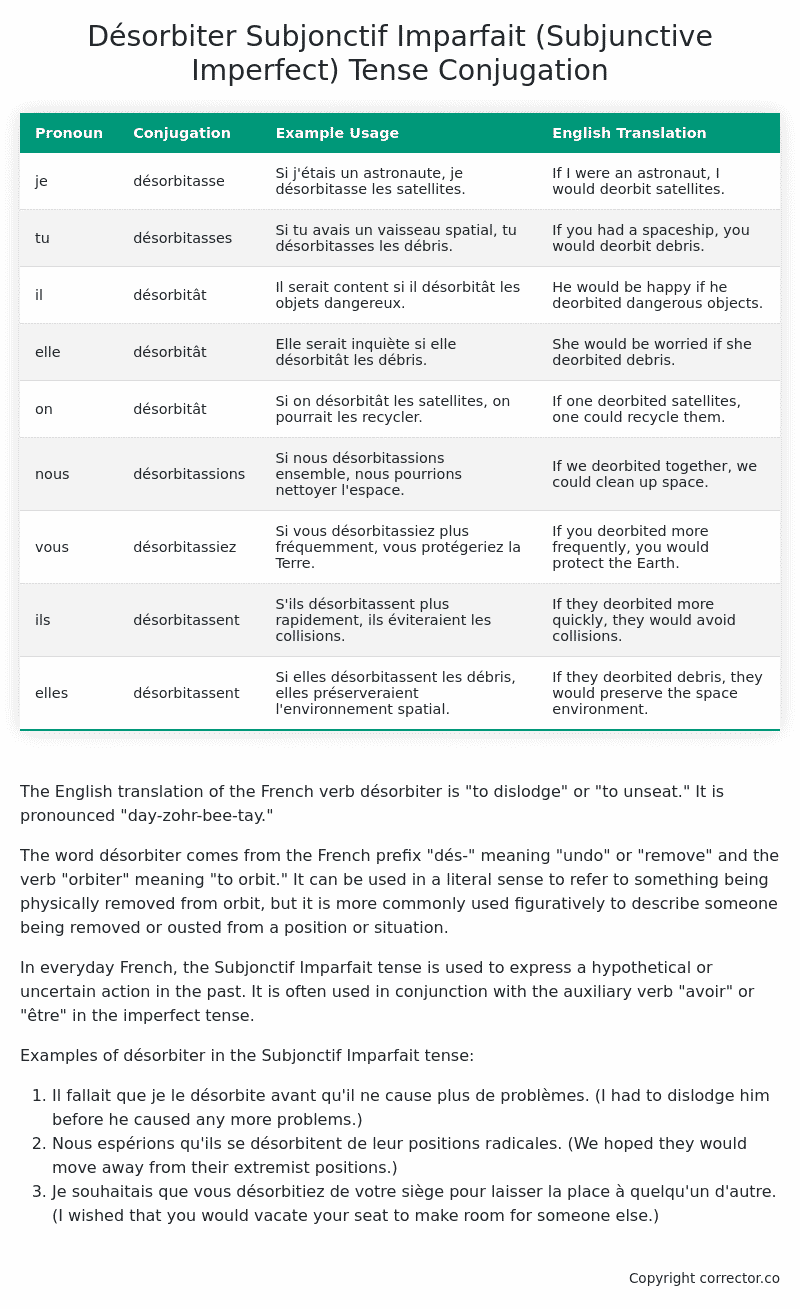Subjonctif Imparfait (Subjunctive Imperfect) Tense Conjugation of the French Verb désorbiter
Introduction to the verb désorbiter
The English translation of the French verb désorbiter is “to dislodge” or “to unseat.” It is pronounced “day-zohr-bee-tay.”
The word désorbiter comes from the French prefix “dés-” meaning “undo” or “remove” and the verb “orbiter” meaning “to orbit.” It can be used in a literal sense to refer to something being physically removed from orbit, but it is more commonly used figuratively to describe someone being removed or ousted from a position or situation.
In everyday French, the Subjonctif Imparfait tense is used to express a hypothetical or uncertain action in the past. It is often used in conjunction with the auxiliary verb “avoir” or “être” in the imperfect tense.
Examples of désorbiter in the Subjonctif Imparfait tense:
- Il fallait que je le désorbite avant qu’il ne cause plus de problèmes. (I had to dislodge him before he caused any more problems.)
- Nous espérions qu’ils se désorbitent de leur positions radicales. (We hoped they would move away from their extremist positions.)
- Je souhaitais que vous désorbitiez de votre siège pour laisser la place à quelqu’un d’autre. (I wished that you would vacate your seat to make room for someone else.)
Table of the Subjonctif Imparfait (Subjunctive Imperfect) Tense Conjugation of désorbiter
| Pronoun | Conjugation | Example Usage | English Translation |
|---|---|---|---|
| je | désorbitasse | Si j’étais un astronaute, je désorbitasse les satellites. | If I were an astronaut, I would deorbit satellites. |
| tu | désorbitasses | Si tu avais un vaisseau spatial, tu désorbitasses les débris. | If you had a spaceship, you would deorbit debris. |
| il | désorbitât | Il serait content si il désorbitât les objets dangereux. | He would be happy if he deorbited dangerous objects. |
| elle | désorbitât | Elle serait inquiète si elle désorbitât les débris. | She would be worried if she deorbited debris. |
| on | désorbitât | Si on désorbitât les satellites, on pourrait les recycler. | If one deorbited satellites, one could recycle them. |
| nous | désorbitassions | Si nous désorbitassions ensemble, nous pourrions nettoyer l’espace. | If we deorbited together, we could clean up space. |
| vous | désorbitassiez | Si vous désorbitassiez plus fréquemment, vous protégeriez la Terre. | If you deorbited more frequently, you would protect the Earth. |
| ils | désorbitassent | S’ils désorbitassent plus rapidement, ils éviteraient les collisions. | If they deorbited more quickly, they would avoid collisions. |
| elles | désorbitassent | Si elles désorbitassent les débris, elles préserveraient l’environnement spatial. | If they deorbited debris, they would preserve the space environment. |
Other Conjugations for Désorbiter.
Le Present (Present Tense) Conjugation of the French Verb désorbiter
Imparfait (Imperfect) Tense Conjugation of the French Verb désorbiter
Passé Simple (Simple Past) Tense Conjugation of the French Verb désorbiter
Passé Composé (Present Perfect) Tense Conjugation of the French Verb désorbiter
Futur Simple (Simple Future) Tense Conjugation of the French Verb désorbiter
Futur Proche (Near Future) Tense Conjugation of the French Verb désorbiter
Plus-que-parfait (Pluperfect) Tense Conjugation of the French Verb désorbiter
Passé Antérieur (Past Anterior) Tense Conjugation of the French Verb désorbiter
Futur Antérieur (Future Anterior) Tense Conjugation of the French Verb désorbiter
Subjonctif Présent (Subjunctive Present) Tense Conjugation of the French Verb désorbiter
Subjonctif Passé (Subjunctive Past) Tense Conjugation of the French Verb désorbiter
Subjonctif Imparfait (Subjunctive Imperfect) Tense Conjugation of the French Verb désorbiter (this article)
Subjonctif Plus-que-parfait (Subjunctive Pluperfect) Tense Conjugation of the French Verb désorbiter
Conditionnel Présent (Conditional Present) Tense Conjugation of the French Verb désorbiter
Conditionnel Passé (Conditional Past) Tense Conjugation of the French Verb désorbiter
L’impératif Présent (Imperative Present) Tense Conjugation of the French Verb désorbiter
L’infinitif Présent (Infinitive Present) Tense Conjugation of the French Verb désorbiter
Struggling with French verbs or the language in general? Why not use our free French Grammar Checker – no registration required!
Get a FREE Download Study Sheet of this Conjugation 🔥
Simply right click the image below, click “save image” and get your free reference for the désorbiter Subjonctif Imparfait tense conjugation!

Désorbiter – About the French Subjonctif Imparfait (Subjunctive Imperfect) Tense
Formation
Common Everyday Usage Patterns
Interactions with Other Tenses
Subjonctif Présent
Indicatif Passé Composé
Conditional
Conditional Perfect
Summary
I hope you enjoyed this article on the verb désorbiter. Still in a learning mood? Check out another TOTALLY random French verb conjugation!


